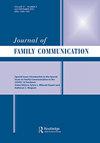Attachment Theory as a Lens to Explain Accommodation, Nonaccommodation, and Loneliness in Relationships between Middle-Aged Parents and Young Adult Children
IF 1.8
Q2 COMMUNICATION
引用次数: 3
Abstract
ABSTRACT The role of individual differences in shaping family members’ experiences has only been sporadically examined in research on communication accommodation theory. This dyadic study (N = 126 middle-aged parents and 126 young adult children) investigated the relationship between parents’ and children’s attachment anxiety and avoidance and self-reported loneliness, and the roles of accommodation and nonaccommodation within that. Among other findings, parents’ attachment anxiety and avoidance positively predicted parents’ perceptions of receiving overaccommodation and underaccommodation, as well as children’s perceptions of receiving underaccommodation. Both parties’ perceptions of receiving underaccommodation positively predicted children’s loneliness. Post-hoc indirect associations suggested that children’s attachment anxiety and avoidance indirectly predicted both parties’ perceptions of receiving underaccommodation, via children’s loneliness. Findings are discussed in terms of the implications of attachment and loneliness for communication accommodation theory.依恋理论作为解释中年父母与年轻成年子女关系中的迁就、不迁就和孤独的视角
个体差异在塑造家庭成员经历中的作用在沟通适应理论的研究中只得到零星的检验。本研究以126名中年父母和126名年轻成年子女为对象,考察了父母和子女依恋焦虑、回避与自述孤独的关系,以及迁就和不迁就在其中的作用。在其他研究结果中,父母的依恋焦虑和回避正向预测父母接受过度住宿和住宿不足的感知,以及儿童接受住宿不足的感知。双方对住宿不足的感知正向预测儿童的孤独感。事后间接关联表明,儿童的依恋焦虑和回避通过儿童的孤独感间接预测了双方对接受不足的感知。研究结果讨论了依恋和孤独对沟通适应理论的影响。
本文章由计算机程序翻译,如有差异,请以英文原文为准。
求助全文
约1分钟内获得全文
求助全文

 求助内容:
求助内容: 应助结果提醒方式:
应助结果提醒方式:


